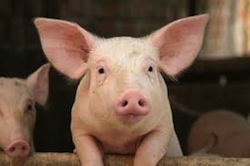Smithfield Foods commitment to renewable energy is showing tangible results according to the company. During the past several years, the company has been monitoring scientific advancements that have removed barriers to efficiently and sustainably create renewable energy from agricultural waste, in particular the use of anaerobic digestion processes that covert decomposing organic matter, such as hog manure, into renewable energy.
“The bottom line is that our company’s commitment to creating renewable energy is about to produce some very tangible and beneficial results,” said C. Larry Pope, president and chief executive officer of Smithfield Foods.
 Pope noted that two Smithfield Foods strategic partnerships at Murphy-Brown LLC facilities in northern Missouri and Milford, Utah, involving anaerobic digestion technology are seeing results and the projects will soon deliver electricity to neighboring communities.
Pope noted that two Smithfield Foods strategic partnerships at Murphy-Brown LLC facilities in northern Missouri and Milford, Utah, involving anaerobic digestion technology are seeing results and the projects will soon deliver electricity to neighboring communities.
“Our Missouri and Utah projects are a classic win-win. We will considerably reduce the greenhouse effects on the Earth’s atmosphere by recycling agricultural waste, help to protect our natural resources and provide a more environmentally friendly energy source,” Pope said.
In northern Missouri, Murphy-Brown of Missouri, LLC (MBM) and Roeslein Alternative Energy, LLC, have announced joint plans to develop a $100 million renewable biogas project. Biogas produces energy when organic matter decomposes without oxygen present. The biogas will be harvested from MGM finishing farms in northern Missouri and construction is set to begin this spring.
In addition, the company’s project Milford, Utah, is ramping up. Murphy-Brown’s
Circle 4 Farms will be producing electricity via two methane digesters. In this project, manure will be converted to energy and as a result, the manure, or solid waste, will no longer be stored in lagoons.
Pope added, “Our manure-to-energy projects are just another step in our sustainability
journey.”

